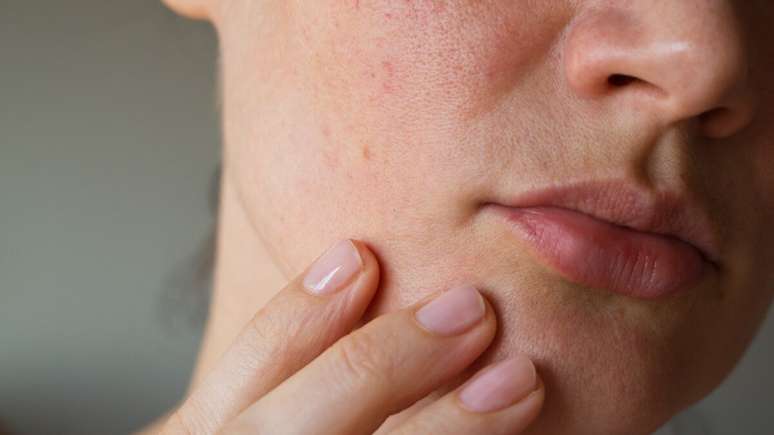Dry skin can have several causes. Find out the main ones and how to avoid this problem!
Summary
Dry skin can be caused by various factors and it is important to maintain hydration to avoid discomfort and pain.
THE dry skin This is a problem that has several causes, as the person’s lifestyle, environment, climate or biological factors can influence the hydration or dryness of the skin.
- Read also: Find out how our skin is directly linked to our lifestyle
It is important to take care of the hydration of the largest organ in the body, which is important for regulating body temperature and protecting the body from bacteria and microorganisms that can attack the human body.
Additionally, dry skin can cause discomfort and pain, especially in sensitive areas, such as the feet and hands.
It is also worth distinguishing between dry skin and dry skin: while the first case refers to only one skin type, in addition to normal, oily and combination skin, dry skin goes beyond each person’s predisposition and is linked to other conditions natural ones.
What are the signs of dry skin?
The main signs of dry skin in these and other areas of the body are:
- Feeling of rough skin;
- Peeling;
- Constant and excessive itching;
- Reddish spots;
- Cracks and fissures;
- Pain;
- White lines and spots;
- Burning, stinging or even small wounds.
Dry skin can be a problem anywhere on the body, especially in the following areas:
- Hands: can become drier due to constant hand washing, especially in the joint area, as this is naturally an area where the skin is under tension and can crack if stretched when the fingers move;
- Feet: the skin of this region, especially that of the heel, can be very dry, rough or even chapped due to running and walking movements, as well as the constant use of socks and shoes;
- Elbows and knees: exposure to the sun without protection, rubbing with clothing and the natural movement of the joints can also cause dryness in these areas of the human body;
- Lips: The lip area can also become drier, either due to contact with the cold during the winter, or through the use of oral medications that have the potential to accelerate dryness in this region.
Dryness begins to occur when the skin becomes parched, a process resulting from the loss of natural lipids. This process leaves the skin without barriers on its surface that help retain moisture.
The more the skin loses moisture, the more the dryness begins to reach the deeper layers, leaving the skin dry.
What are the possible causes of dry skin?
The causes of dry skin are diverse and can occur in combination, which contributes to worsening the condition. Among the main reasons for dryness are:
- Environmental reasons, such as cold, dry weather or hot air;
- High incidence of ultraviolet sunlight;
- Constant cleansing with hot water and soaps that eliminate skin barriers;
- Diet low in fruit, vegetables and foods that are good for the skin;
- Low water consumption;
- Smoking;
- Do water sports, such as swimming or water aerobics, as chlorine helps dry out the skin;
- Aging, as age reduces the skin’s natural sebum and the production of hormones such as estrogen;
- Use of diuretic drugs, which accelerate the elimination of water and contribute to poor skin hydration;
- Diseases such as diabetes, which can cause damage to the nerves responsible for producing sweat and fat; or atopic dermatitis, which interrupts the natural production of fat in the skin;
- Lack of routine skin care and hydration, such as not using sunscreen or cleansing your face.
How to avoid dry skin?
Dry skin can be avoided in several ways, many of which are linked to habits that can be adopted into your routine.
- Read also: 6 essential skincare products that never go out of style
Among the main skin care products that help keep it hydrated for longer are:
- Expose yourself less to sunlight and use sunscreen or clothing with protection from ultraviolet rays, such as hats, caps, visors, sunglasses and UV clothing, especially in times of increased sunlight;
- Keep the air humid, especially in air-conditioned or heated environments;
- Use skin protection in winter and summer, such as body and lip moisturizers and sunscreens;
- Reduce the temperature of the water in the tubs, so that it is always hot or cold, or reduce the time exposed to hot water;
- Wear gloves when handling cleaning products or washing dishes, so that soap or detergent does not eliminate the skin’s natural barriers;
- Use mild soap when washing clothes, as perfumes and dyes can contribute to drying out your skin when you wear clothes;
- Prefer clothes made with natural materials, such as silk and cotton, especially in garments that come into direct contact with the skin;
- Consume good quantities of water and liquids during the day, to maintain high hydration;
- Maintain a proper diet with foods that help hydrate your skin.
If you want to take better care of yourself and learn tips on health and self-care, access the contents of Terra Você!
Source: Terra
Ben Stock is a lifestyle journalist and author at Gossipify. He writes about topics such as health, wellness, travel, food and home decor. He provides practical advice and inspiration to improve well-being, keeps readers up to date with latest lifestyle news and trends, known for his engaging writing style, in-depth analysis and unique perspectives.








